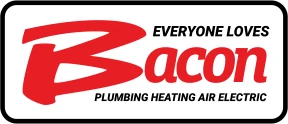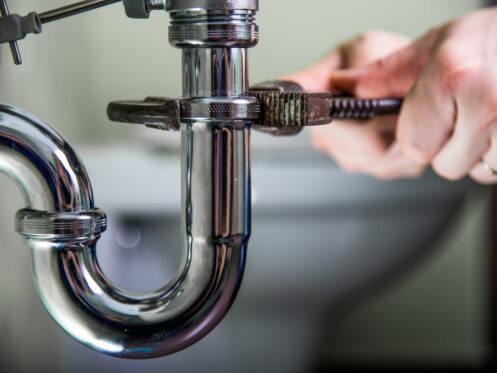Plumbing pipes play a significant role in the everyday activities of your home. According to the United States Geological Survey (USGS), the average household occupant uses 80-100 gallons of water per day, and the average plumbing pipes distribute water at a flow rate of about 6.0-12.0 gallons per minute. Given the importance of functional plumbing, the last thing that homeowners want to deal with is the risk of burst pipes. This occurrence of burst pipes can disrupt daily tasks and cause catastrophic property damage. The resulting water damage can cause mold and mildew growth as well as compromise the structural integrity of the house. But what can homeowners do to keep pipes from bursting? A look at the top seven ways to prevent burst pipes can help you implement a solid plan for protecting your home.
Why Do Pipes Burst?
Pipes can burst for a variety of reasons. The most common causes of burst pipes include changes in temperature, environment, or pressure. A look at the typical reasons for burst pipes can provide guidance on steps in prevention.
Freezing Temperatures
Extreme temperature is one of the top reasons that pipes burst. As the water inside pipes cools down and drops below 32 degrees Fahrenheit, the fluid can slowly begin to freeze. Once fluid solidifies into ice, it expands within pipes. As the ice expands, it creates a buildup of pressure that eventually causes pipes to burst. While breakage or bursts can occur anywhere along the pipe system, pipe joints are especially vulnerable due to low surface area and the pressure of redirecting water to other parts of your plumbing.
Corrosion
Corrosion takes place when metals react to the oxygen within water. This process is called oxidization. Any type of metal pipe can corrode. For example, plumbing made from galvanized steel, cast iron, brass, or copper can suffer corrosion and degrade over time. In addition to oxidizing metal, the minerals in hard water can build up in pipes and also speed up the corrosion process. Corrosion ultimately weakens pipes and causes them to crack, split, or burst.
Untreated Clogs
Clogs that form inside pipes can block the flow of water. This blockage causes pressure to build up. The accumulation of pressure can cause pipes to rupture or burst. Clogs located deep within the water line require professional intervention to prevent a breakdown of your overall plumbing system.
Tree Roots
Tree root systems can invade plumbing and cause pipes to rupture, pop, or burst. As a tree grows larger, its root system spreads underground in search of replenishing moisture. These roots can enter your plumbing as they seek additional water vapor. Plumbing networks built in compacted soil are particularly susceptible to tree root invasion. A professional plumber can use a camera probe or other specialized equipment to determine whether roots have begun to entangle or destroy your piping system.
Shifting Soil
While such changes are hardly noticeable in our everyday lives, the soil beneath your home’s foundation can easily fluctuate. These fluctuations can result from earthquakes and seismic activity as well as events such as flooding. Temperature changes that cause the soil to expand or contract quickly can also shift piping components. Finally, major landscaping or construction projects are notorious for altering the position of soil.
Accidental Impact
Accidental impact with exposed pipes can cause them to crack or burst. This can occur indoors within basement or utility rooms, but it’s also prevalent among outdoor exposed pipes in the yard. Even making mistakes like using exposed pipes to hang items or decorations can result in unexpected damage later.
High Water Pressure
Along with extreme temperatures, high water pressure is one of the top causes of burst pipes. According to the Environmental Protection Agency (EPA), normal residential water pressure should fall between 40 and 80 PSI. Water pressure that exceeds 80 PSI can cause your pipes to rattle and shake. This excess wear eventually causes the pipe to fracture or burst.
How Can Homeowners Prevent Burst Pipes?
A burst pipe is a major inconvenience, and some causes like outside temperature or environmental changes may feel completely outside of a homeowner’s control. However, there are important steps you can take to minimize the likelihood of damaged pipes. From insulation to plumbing inspections, these precautions can help protect your property.
1. Insulate Exposed Pipes
It’s important to insulate exposed pipes in areas like basements, attics, garages, and exterior walls. These pipes are vulnerable to the effects of extreme temperatures or accidental impact. A plumbing professional can advise on the best materials for insulation, including rubber, fiberglass, or industrial foam. In addition to pipe insulation, a home services professional can address drafty rooms to keep indoor plumbing at a consistent temperature. This process can include caulking windows and door frames as well as sealing leaks from ductwork or vents.
2. Install Temperature Monitors and Controls
Another way to prevent pipes from expanding or contracting is to install temperature monitors and controls. For example, a freeze alarm provides alerts when the indoor temperature begins to drop. You can then adjust the thermostat or take additional steps to prevent pipes from freezing. You can also ask a plumber to install a hot water recirculating pump. This regulatory device monitors plumbing and draws hot water from the main water heater if the piping system’s temperature drops beneath a predetermined setting.
3. Replace Corroded Pipes
An important step is to replace aging or corroded pipes. Signs that your pipes have suffered corrosion include discolored water, metallic smells, or unusual sounds during pipe operation. In addition, homeowners with pipes over 25 years old or who have hard water should never delay in obtaining a pipe inspection. A plumber may need to reroute the system or replace metal pipes with corrosion-resistant PVC pipes instead.
4. Drain Outdoor Water Lines
In addition to monitoring indoor pipes, it’s also important to weatherproof outdoor pipes to stop them from freezing and bursting during winter. Each year, homeowners should completely drain outdoor water lines connected to sources like swimming pools and sprinkler systems. Likewise, close the valves on outdoor spigots or hose bibs and insulate exposed pipes as needed.
5. Secure Loose Pipes
Due to constant use, pipe connectors can loosen over time. Poor initial installation or a bad soldering job can hasten this loosening process. A telltale sign of loose pipes or connections is the sound of water hammering. Reach out to a plumber to correct the issue before pipes eventually burst or break.
6. Regulate Water Pressure
Keep water pressure normal by contacting a plumber to evaluate the issue. A plumber can use an industrial gauge to test whether your water pressure exceeds the recommended maximum of 80 PSI. If necessary, a professional can also install a pressure-reducing valve to help regulate force and flow throughout your piping system.
7. Schedule an Annual Plumbing Inspection
One of the best ways to prevent burst pipes is to keep up with your annual plumbing inspections. During an inspection, a plumber can use specialized equipment to identify problems and remove blockages or clogs. A plumber can customize tasks such as installing a hard water treatment system or replacing irreparably damaged pipes.
Contact Us Today
Burst pipes can have a negative impact on your household’s quality of life. Fortunately, professional plumbers can help. Bacon Plumbing Heating Air Electric offers plumbing for homes in Rockwall, TX and the Dallas-Fort Worth area. We offer drain cleaning and employ advanced techniques such as hydro jetting, rooter services, camera inspections, and backflow testing to evaluate the plumbing system of your home. In addition to our burst pipe repair services, we can fix sewer lines and slab leaks. We work with water heaters, tankless heaters, and sump pumps, and we can even install filters or softeners for the best indoor water quality. Contact Bacon Plumbing Heating Air Electric today for all of your plumbing needs.




